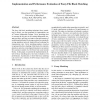Free Online Productivity Tools
i2Speak
i2Symbol
i2OCR
iTex2Img
iWeb2Print
iWeb2Shot
i2Type
iPdf2Split
iPdf2Merge
i2Bopomofo
i2Arabic
i2Style
i2Image
i2PDF
iLatex2Rtf
Sci2ools
110
click to vote
USENIX
2007
2007
Implementation and Performance Evaluation of Fuzzy File Block Matching
The fuzzy file block matching technique (fuzzy matching for short), was first proposed for opportunistic use of Content Addressable Storage. Fuzzy matching aims to increase the hit ratio in the content-addressable storage providers, and thus can improve the performance of underlying distributed file storage systems by potentially saving significant network bandwidth and reducing file transmission costs. Fuzzy matching employs shingling to represent the fuzzy hashing of file blocks for similarity detection, and error-correcting information to reconstruct the canonical content of a file block from some similar blocks. In this paper, we present the implementation details of fuzzy matching and a very basic evaluation of its performance. In particular, we show that fuzzy matching can recover new versions of GNU Emacs source from older versions.
Related Content
| Added | 02 Oct 2010 |
| Updated | 02 Oct 2010 |
| Type | Conference |
| Year | 2007 |
| Where | USENIX |
| Authors | Bo Han, Peter J. Keleher |
Comments (0)

